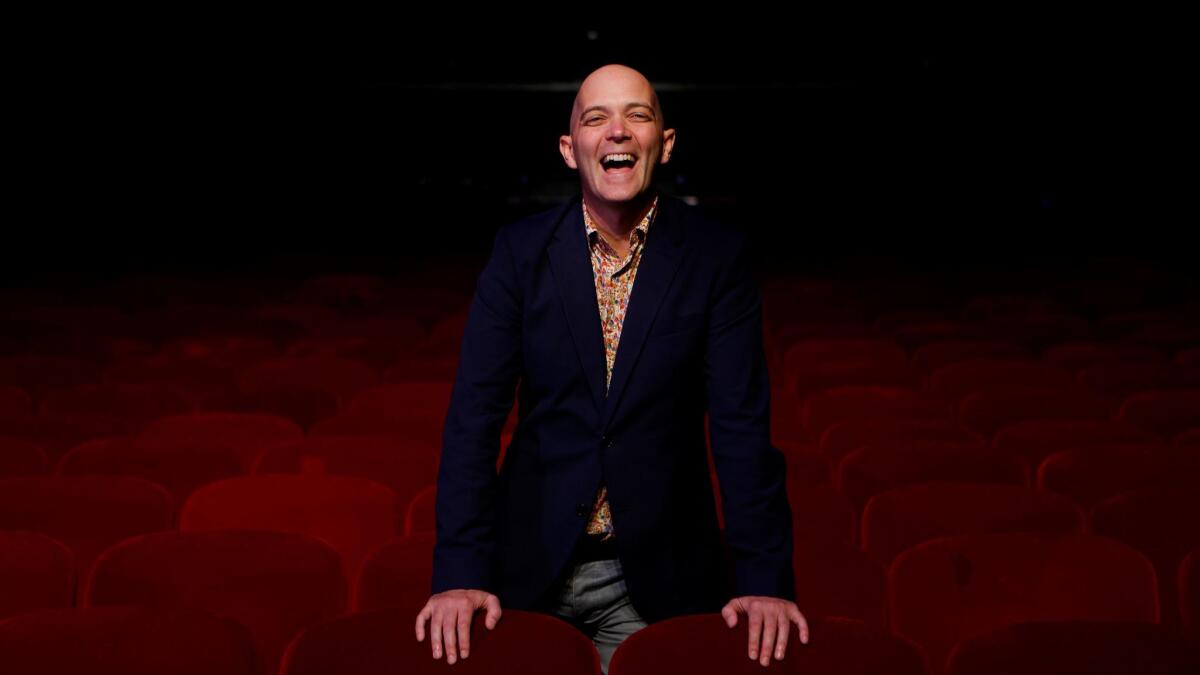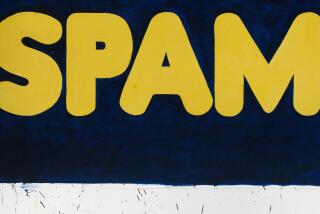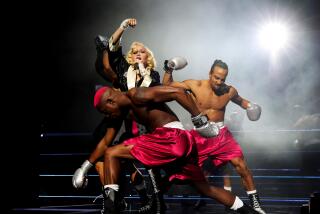Taylor Mac brings 24 decades of delirium and music to Los Angeles

The show features 246 songs. It’s 24 hours long, split into six-hour chapters. And, yes, you are expected to sit through all six hours. This is theater of the unexpected; it is theater of calamity; it is theater according to the gospel of Taylor Mac.
Since the performance artist first staged portions of this delirious piece of experimental theater, “A 24-Decade History of Popular Music,” at Joe’s Pub in New York City in 2011, the show has evolved into an artistic juggernaut and its creator heralded as a perspicacious shaman of the counterculture.
In the lobby of the Theatre at Ace Hotel in downtown Los Angeles on a recent afternoon, however, Mac shrugs off the hype surrounding his first tour of the full “24-Decade History.” He’s just a vessel for the art, he insists.
The show, in which each hour of music represents a decade, seeks to tell the story of communities built as a result of being torn apart: the defiant triumph of minorities, LGBTQ people, women, the disabled and the chronically disadvantaged over the dominant cultural forces of homogeneity and oppression.
“I’m not representing a community. I’m representing a history and a whole country,” he says, smiling slyly. “It’s partially why I’m phantasmagorical when you look at me. You don’t necessarily see a human, but you see a fool in the Elizabethan sense.”
Mac is bald with a shiny head, mischievous blue eyes and a coquettish smile. His voice is slightly raspy and his demeanor relaxed. As an artist, he thinks of himself as a bridge between “the normative and the insane, between male and female, between the queers and the straights, and the West Coast thing and the East Coast thing.”
In “24-Decade History” he performs in ravishing drag created by a costume designer who goes by the name of Machine Dazzle and sometimes follows Mac onstage to make adjustments to this feather or that sequin in real time. Drag isn’t a costume for him to hide in, Mac says, it’s exposing what he looks like on the inside.
“The amazing thing about that is that queer people don’t get to represent America, queer people are always just in America, we’re only allowed to be ourselves, which is a queer person. So to use a queer’s body as a metaphor for the entire country is fresh,” he says with relish.
Mac is in town to begin work with Kristy Edmunds, artistic director of the Center for the Art of Performance at UCLA, who commissioned a decade of the show when Mac was creating it. The show won’t open at the Ace for another nine months, as part of CAP UCLA’s 2017-18 season. But staging the piece — which will involve more than 200 performers, many of whom will be cast locally, and almost as many behind-the-scenes players — will be a Herculean effort of coordination, stamina and creativity.
Six decades of music will be unfurled at one time, the whole “History” performed over the course of two weeks. The 246 songs begin in 1776 and end in present day.
It is not musical theater, it is not a concert and it is not pure theater.
Mac calls the show a “ritual sacrifice.” Its power lies in its duration. The audience must feel the weight of history and time; they must see Mac’s body exhaust itself and hear his voice deteriorate with the effort of it all.
Identity politics are not the point, he says. They are the subplot.
“I think of art as a seditious act. Sometimes it’s asking you to rebel against the government, but really it’s asking you to rebel against an obstinate sense of self,” he says. “So you come in and say, ‘I’m this kind of person,’ and the art says, ‘No, no, dig a little deeper, go a little wider, bring a sense of wonder into your life,’ so that’s what we’re doing up there, we’re sacrificing obstinance.”
The result was a finalist this year for the Pulitzer Prize in drama. When Mac performed an almost-three-hour sneak peak of the show at UCLA’s Royce Hall in March, Times theater critic Charles McNulty wrote an exuberant review, noting that as a performer, “Mac might well be the love child of David Bowie and Liza Minnelli.”
To use a queer’s body as a metaphor for the entire country is fresh.
— Taylor Mac
Here at the Ace, Mac appears onstage to deliver a nearly 30-minute monologue to an enraptured audience of more than 100 artists, creators and donors who have gathered to explore the possibility of contributing artistically or financially toward staging “A 24-Decade History” in Los Angeles.
Says Edmunds, “You don’t commit to a show like this if you don’t know you can carry its integrity.”
The show is very much a living, breathing entity in that you can’t control everything that will happen during a six-hour stretch of live theater. Hundreds of local performers need to be cast. In Los Angeles, for example, the audience might see a female mariachi band and a children’s choir. Even the fabrics for the costume design are expected to be sourced locally.
The audience plays a crucial role as well. It might participate in a bread line during the Great Depression, create a funeral procession for Judy Garland, or rearrange 80 chairs. In 2016 Mac performed the entire show over a single 24-hour stretch in New York for 700 people who he says became “deranged in their emotional availability.”
It was a feat that he intends to accomplish only once.
“The goal was to make something tangible out of an ephemeral art and it worked,” Mac says. By using “exhaustion to dream the culture forward,” viewers came to embrace the fact that “we weren’t making something accessible, but extraordinary. And we were building it together.”
On this particular evening Mac asks his Los Angeles audience to help him build a future promise. He asks them to commit to viewing art as something as worthwhile as a 40-hour workweek.
“You must protest the tools of reduction,” he says. “It needs to be long so that you feel the weight of it — the onslaught of it — and so that you have an opportunity to transform as a result of that weight.”
In other words, this isn’t art to be taken lightly. Watching it should — and will — take effort.
Popular music is the ideal medium to convey the complexities of history because it is built through imperfection, Mac says. Imperfect rhymes, simple chords, unpolished vocal deliveries.
“You could argue that classical music is about perfection and virtuosity — trying to touch the hem of God,” Mac says. “Popular music is about reaching people. It’s there to rally you to a cause. To celebrate together. To mourn together. To love together.”
Mac will love you for 24 hours — an experience he hopes will never leave you.
MORE NEWS AND REVIEWS:
The puppet orgy is back in a triumphant reworking of ‘Young Caesar’ at Disney Hall
Sensuality, brutality, madness: The drama of Eifman Ballet in ‘Red Giselle’
Pakistani rape survivor Mukhtar Mai comes to L.A. to see justice, if only onstage
Ben Vereen, Ronald Reagan and the travesty of blackface, potently remembered
More to Read
The biggest entertainment stories
Get our big stories about Hollywood, film, television, music, arts, culture and more right in your inbox as soon as they publish.
You may occasionally receive promotional content from the Los Angeles Times.







